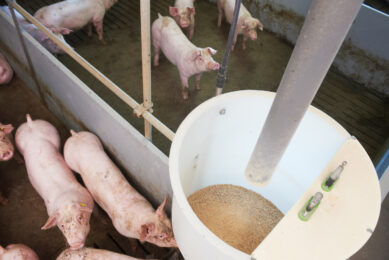The vitamin C question
This is a quite old question, which has yet to receive a definitive answer! Despite the fact that pigs, like most animals (excluding humans, primates, and guinea pigs), can readily synthesise enough vitamin C to cover their requirements, many manufactured diets and premixes contain large concentrations of this vitamin. Let’s explore this issue a bit further…
This is a quite old question, which has yet to receive a definitive answer! Despite the fact that pigs, like most animals (excluding humans, primates, and guinea pigs), can readily synthesise enough vitamin C to cover their requirements, many manufactured diets and premixes contain large concentrations of this vitamin. Let’s explore this issue a bit further…
Vitamin C (ascorbic acid or ascorbate) is a naturally-occurring metabolite of glucose. The absence of the enzyme L-gulonolactone oxidase promotes vitamin C to the status of a dietary essential nutrient for only a few mammalian species.
The metabolic functions of vitamin C include free radical detoxification, vitamin E rejuvenation, collagen, norepinephrine and carnitine biosynthesis, and neurotransmitter and metal ion metabolism.
Also, vitamin C is thought to play a significant role in the functionality of the immune system. During periods of stress (e.g., excessive heat, disease challenge, fighting, crowding) body stores of vitamin C are depleted, and high concentrations of vitamin C metabolites are excreted in urine.
Synthesising
Pigs are able to synthesise vitamin C as early as their first week of age, whereas large quantities of vitamin C are present in sow’s colostrum and milk.
However, weaning at an age of 14 to 28 days imposes an immense nutritional, social, and environmental stress on pigs. In fact, the plasma concentration of vitamin C drops drastically in pigs shortly after weaning. This has been taken as evidence of either an insufficient biosynthesis rate and (or) an increased requirement for vitamin C.
Weight gain
In a study conducted in the 80s, pigs weaned at 4 weeks of age were offered diets fortified with increasing concentrations of vitamin C (0, 330, 660, and 990 mg/kg) in a 28-day growth assay. Overall, weight gain was improved by 17% and feed intake by 13% in pigs offered the vitamin C-fortified diets.
Following this unique study, a number of experiments were conducted in several institutions worldwide to verify and refine the effects of supplementation with vitamin C, but with limited success as results have been mixed and ambiguous.
In most studies, fortification of nursery diets with ascorbic acid at various levels ranging from as little as 75 to as much as 990 mg/kg did not result in enhanced growth performance, haemoglobin concentration, immunity, or survivability. Also, injections with vitamin C (40 mg/kg every other day) did not enhance growth performance. Other trials, largely unpublished, showed some limited response.
Crowded or stressed pigs benefit?
It has been suggested that pigs crowded or stressed by cold temperatures may benefit from vitamin C supplementation. To test this hypothesis, a large study involving 11 experimental stations and 1,296 nursery pigs was conducted without any significant response to dietary vitamin C supplementation (625 mg/kg).
Vitamin C is sensitive to a variety of environmental factors including heat, oxygen, and alkalinity. It has been proposed that the lack of response observed in these experiments was due to inevitable vitamin C losses that occurred during storage and feeding.
However, in most of the experiments, the researchers were aware of this problem and they tried to avoid considerable vitamin losses by frequent preparation and cool storage of the diets.
Interestingly, in recent studies, the use of more stable forms of vitamin C (magnesium-L-ascorbyl-2-phosphate and L-ascorbyl-2-polyphosphate) did not help in eliciting a constant and repeatable positive growth response in segregated or early-weaned pigs.
Limited evidence
Today, there is some limited evidence suggesting that supplemental ascorbic acid might be beneficial during stress in certain species (e.g., humans, chickens). However, in pigs there are no solid data to suggest such a beneficial effect.
There are, indeed, some research reports that suggest trends toward increased growth performance in nursery pigs offered vitamin C-fortified diets, but these trends have not been statistically significant (P>0.05). In fact, it is somewhat difficult to explain most of these trends because they are neither repeatable nor biologically justified.











